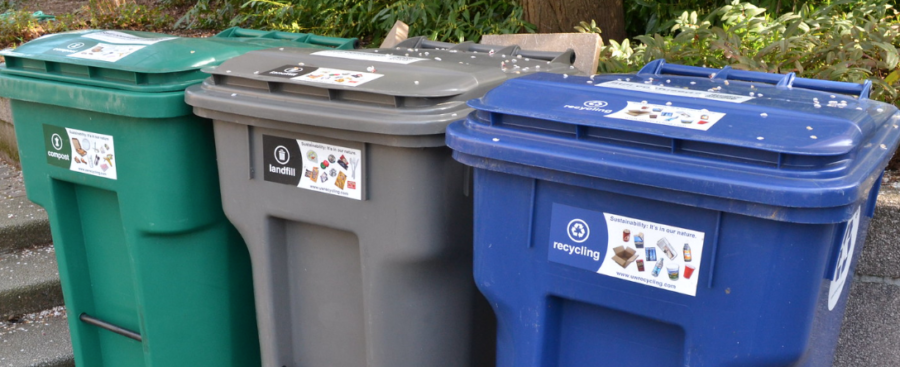Why don’t people recycle in NYC schools?
November 7, 2019
Freshman Sam Espinobarros buys a Fiji water everyday before school. He says, “It’s a habit. I put it in the blue recycling bin at school.” Little does he know, it doesn’t always get recycled.
Without realizing, you throw your lunch tray into one of the recycling bins without another thought. But that one decision you just made will affect the rest of the school.
Every day, plastic is made whether it’s for water bottles, bags, or any other accessories. As of August, 2019, New York City inhabits about 8.6 million people, making it the largest city in the U.S. 14 million tons of garbage is thrown out annually by New York. That’s an astonishing 3.5 pounds a day for each resident of New York.
Children in New York City go to school every day and while they are there, they usually throw out waste that could be recycled. There are rules and restrictions for recycling and waste management in New York City. These rules and restrictions are hard to follow and as a result, recycling rarely gets done in schools. How can we change this?
Taiwan’s garbage and recycling system should be used to influence the schools in New York City. They have a system that works smoothly with over 23 million people.
Ms. Strassler, a social studies teacher, said, “Sometimes, I’ll bring home a plastic bottle if I used one, I usually don’t use a plastic water bottle [shows reusable water bottle] but if I do, I’ll put it in my bag and recycle it at home.”
Ms. Strassler usually uses a reusable water bottle but when she doesn’t, she always remembers to recycle as much as possible.
Why is it important to recycle?
It is critical to recycle, especially in such a materialistic society as we have. Today, everything we buy has some kind of packaging. Even fruits such as watermelon, with a peel, are cut up and put in plastic containers to be sold.
It has gotten progressively worse with modern habits such as online shopping. Amazon gained traction since it’s start-up in 1995, but there has been a progressive incline in the past few years. Most people will know what Jeff Bezos’ multi-billion empire is: Amazon. Every single thing has to be shipped to your house directly and while it is convenient, it uses lots of needless packaging.
Another habit that a lot of people succumb to everyday, is take out food. It is a quick and easy way to eat food, and it’s even easier to order with online ordering apps like Grub Hub, Uber Eats, Seamless and Post Mates, With takeout comes unnecessary packaging that could’ve been avoided.
The sustainability coordinator and Science teacher, Mr. Mulroy, says that recycling “has a huge impact on preserving habitats, reducing carbon emissions, and pollution. Recycling means that there’s less of a need for destruction. There’s less habitat destruction in obtaining these materials, mostly mined metals, and there’s less energy used when processing the ore and refining and collecting it into a final product.”
When you recycle, materials can be reused, allowing additional materials to be mined. When said materials are being obtained, habitats and ecosystems are destroyed.
Below is a diagram of how ecosystems work. Khan Academy writes “Ecosystems can be knocked out of equilibrium by disturbances, disruptive events that affect their composition.”
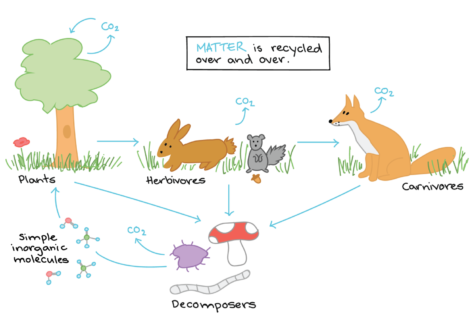
Humans negatively leave a lasting impact on many habitats and some of this behavior can be fixed. If you recycle, the materials are reused and the only process needed to get back to the final product is remelting and re-molding. So, in change, you waste fewer materials and it’s better for the environment.
In a google form survey about recycling, an anonymous source said, “Recycling is super important because these materials will sit in landfills forever and take a huge amount of time to disintegrate without recycling. I think it is one of the simplest ways to help the planet but many people still don’t do it.” Many other respondents gave similar answers and expressed many ideas that recycling was a necessary but not a too difficult task that aims to improve conditions on earth.
So for a multitude of reasons including, saving materials and energy, recycling is very important.
NYC School Recycling Guide
According to the NYC School Recycling Guide, students and staff alike should be updated about procedures so that recycling in the schools goes smoothly and easily. But the way the system works and is structured, it is very hard to properly recycle, even if you place the correct objects in the right bins.
It is hard because both the New York City iSchool students and the Chelsea students have to recycle properly, and if one kid puts the wrong material in a bin, everything in that one has tobe thrown out.
Ms. Strassler has been a teacher at the iSchool for nine years, so she knows how the recycling works. She says at first she “definitely labeled them but once I realized they were taking everything in the bins and throwing it all away together, it didn’t matter because the custodians are still dumping it together.”
She doesn’t blame the custodians, though. “They’re just doing what they’re told to do because they get in trouble when even a single wrong piece is mixed into it. It’s a vicious cycle.”
If we know how hard this structure is to enforce, what can we do to ensure that schools in New York, including the iSchool, can recycle with an efficient system that has positive and indefinite results?
In an interview, Mr. Mulroy said, “We can recycle. Period. The fact is it’s such a massive intake [waste] and that there’s two schools in this one building that makes it even harder. It would require a lot of coordination and buy-in from staff and students as well as infrastructure.”
Ms. Bailey, the principal, expresses similar ideas as Ms. Strassler and Mr. Mulroy.
Ms. Bailey said, “ Each receptacle has to be completely clean and separated: paper with paper, bottles with bottles. I think we’ve done a bad job, or we can do a better job of making sure things are labeled correctly for students so they put their things in the right place.”
There needs to be reforms to recycling and enforcement as demonstrated through a shared understanding of just how hard it is to recycle among the staff at the NYC iSchool.
Who recycles?
Everyone knows what recycling is and the basic premise of it. Who recycles, where do they recycle and why do they recycle? In a recent survey about recycling, eighty-three students ranging from ninth graders to twelfth graders answered a few questions about their recycling habits.
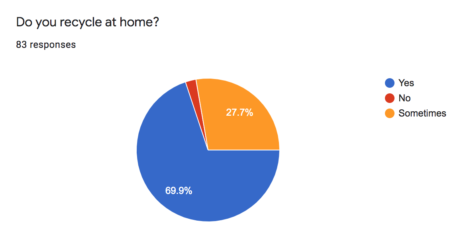
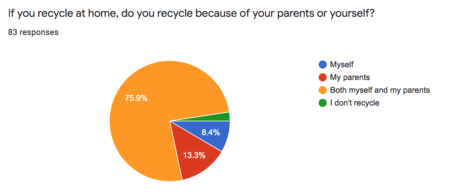
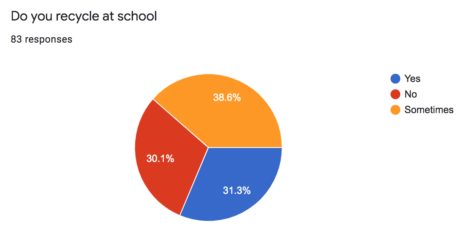
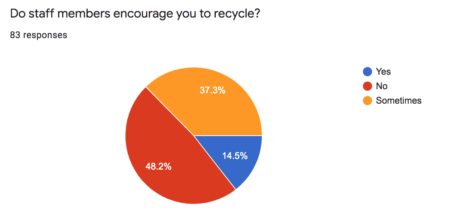
Description: Above are four charts from a recycling survey answered by students at the NYC iSchool.
Source: It was a survey sent out to participating students from the NYC iSchool.
69.9% of respondents said they do recycle at home, compared to 31.3% that recycle in school. 27.7% of the high schoolers polled said they sometimes recycle at home, while 38.6% sometimes recycle in school. A mere two people, or 2.4%, don’t recycle at home in comparison to the significantly larger percentage of 30.1% that don’t ever recycle at school.
Based on these questions, about three-fourths of these students recycle at home because they want to recycle but also because of their parents. The difference in the percentage of who recycles in school and at home is drastic, yet not surprising.
Local law 19
A local law was passed in 1989 requiring all New York City schools to recycle. In it, it specifies schools must recycle materials into separate and clearly labeled bins. For the recycling to go on in the school, a sustainability coordinator has to be appointed.
Mr. Mulroy said “I’m sure there are more responsibilities, but they’re not being fulfilled.” For him, on top of teaching multiple other science classes and modules like Astronomy and Astrobiology, being a sustainability coordinator isn’t a top priority.
How is he supposed to be expected to take on all of the responsibilities as the coordinator when there are already so many things for him to do?
Ms. Strassler states, “In NYC there’s the City Council and the city council passes like laws and ordinances for New York City and each of the boroughs has their representatives and the national and state government and the city council can work together to suggest and pass things.”
Local laws can be passed by the City Council and these members are elected by “People voting on election day for city council people to represent them and their neighborhood,” according to Ms. Strassler.
Overall, the laws put in place for recycling and waste management are unrealistic and unachievable.
How does Taiwan recycle?
Taiwan was formerly known as Garbage Island. Two-thirds of the landfills had been filled up already and the need to reform was dire. With time, new rules and regulations, they completely changed the way residents recycled and dealt with garbage. It is a beneficial thing that has changed the way people live in Taiwan.
The citizens start the cycle by buying government-approved bags where they place mixed waste, while recycles can be put into any bags. Twice a day, the two trucks come around and play music so people know to take out their waste. The mixed trash goes in the large yellow truck while the recyclable materials go into a smaller white truck.
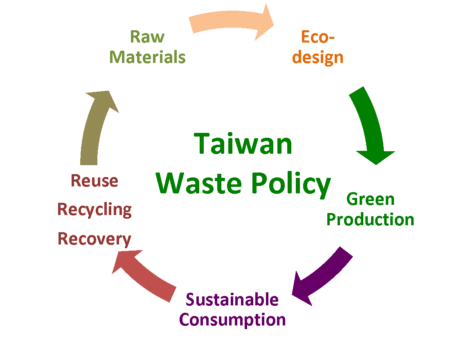
Lee Wei-bin, a 37-year-old nurse says, “I can go to the station whenever I want and also get some money back.” Her job doesn’t allow her to be home when the trucks come and the system is structured so people like her always have the opportunity to properly dispose of their waste while being rewarded for doing so.
There is also a booth where residents can recycle bottles and cans. In return, they have money added to their mass transit card, which is a metro card. If you are caught getting rid of your trash, you are fined or publicly shamed.
Why should New York City base their recycling system on Taiwan’s?
New York should use the Taiwanese system to influence recycling in NYC schools. The two trucks come every day and can be depended on. No matter rain or shine, citizens know it will come.
Garbage trucks come around New York City daily, so we already have a system. All we need to do is participate and slightly change rules and regulations so they are properly enforced. About 23 million people are living in Taiwan compared to the 9 million people in New York City.
If their system is working and close to perfect with so many people, how hard can it be for New York? We have more funds and more resources than they did when they started. We need to help our earth. So many attended the climate strike that doesn’t do things to help climate change. Recycling is low energy and small time commitment that can be a good first step to doing the right thing.
Plus, the school recycling program doesn’t have any repercussions to show students that recycling is important. So, by using the Taiwanese system as an influence, we can create an effective and reinforced structure that will benefit the environment and schools in New York City.
How can NYC implement Taiwan’s system in schools?
There are a few key elements that keep Taiwan under control and functioning.
One, everyone has a shared understanding of how important recycling is. All citizens are highly familiar with what recycling is, how to do it and why it is so important. The sound the trucks make when coming around is a recognizable sound, such as the sound an ice cream truck makes when cruising down the street.
Two, there are strict rules that are supervised and revisited to make sure all are being followed. In NYC, one of the major flaws is that there are rules set in place but they aren’t pursued.
Lastly, there are consequences to citizens actions. When they don’t recycle the correct way or try to get rid of garbage in a way that it is illegal, they can be fined and sometimes publicly shamed. In New York, nothing will happen if you don’t follow the regulation.
In NYC schools, the students should be more informed about recycling, why it is so important and what they can do about it. In previous schools, the students were given the bins but weren’t instructed on how to use them or why they should use them. They weren’t informed about recycling and that is where students should learn about recycling, when they are younger and forming habits.
While there are rules in schools, there isn’t anyone checking that students are recycling. For students, their first thought isn’t that they need to recycle, they’re probably going to be focused on something else. With no one checking and making sure recycling is happening in schools, recycling won’t happen.
Even though there should be someone in schools checking recycling, they won’t be there all the time. Instead of getting in trouble, like Taiwanese people, they should be encouraged until they recycle because it’s important for the environment.
What can YOU do about it?
Now that you have all this information, you might think, “Okay, but what can I do about it?” It’s not one thing or another that you can do but a combination of things. Mariela Quintana has many helpful tips on how to be more mindful to make space to properly recycle in your own house or apartment.
First of all, “Your landlord is required to provide an accessible central recycling area with signs that explain what and how to recycle and in general to inform you and your neighbors of the recycling rules and regulations.”
If you don’t have access to a place to recycle, you should bring it up with your landlord because it’s a requirement in NYC apartments. It is sometimes hard to remember or be conscious of your recycling habits.
Quintana says “Use heavy-duty magnets to hold a sturdy trash bag to the side of the fridge to toss plastic, glass, cans into to avoid having to squeeze an additional trash can under the sink or in a corner. When it gets full, take the whole bag down to the blue bin and drop it there. You can also hang a plastic bag on the knob of your front door.”
In any house, especially a small apartment, everything makes it more cramped. By keeping it in a bag by the door, you are often reminded to take it out but also when you are already leaving, it is convenient to take it with you.
If you already recycle, you can make sure you recycle properly by putting the clean, rinsed items in the correct bin. If you sometimes recycle, recycle more often all the time. If you don’t recycle, recycle as often as possible. I know it takes time and effort and you might think it won’t do anything because you’re just one person. But it does matter. You’re making a difference.
No matter your recycling situation, you can start composting with the various compost drop off centers around New York. Composting is good for the environment and soil while cutting back on food waste in dumps.
If for some reason, you are unable to recycle and/or compost, educate yourself about the topic. This isn’t the only article out there about recycling. If you read up about it, it is a fascinating topic that is important, especially nowadays, because it is a relevant topic that can affect people, places and animals in the world.
Anne Kirrane, the principal of PS 81, says, “I think we’re pretty much under control. We do and will always tell the children to make good choices.” She isn’t concerned about the recycling in 81 because staff encourages students to recycle “by giving them bins that are labeled for what goes where.”
By doing so, the students know what materials and waste goes where in an environment where they are actively encouraged to recycle and participate in the curriculum that includes a “heightened enlightenment about recycling because of our civics program at the school.”
By educating kids about recycling, they form habits that are passed on and remembered later in life. It can be better to start as early as possible because habits are usually during childhood. According to Psychology Today,“Old habits can be difficult to break, and healthy habits are often harder to develop than one would like. That’s because the behavioral patterns we repeat most often are etched into our neural pathways.”
As long as we develop beneficial habits like recycling, the planet will become a better place for all.
